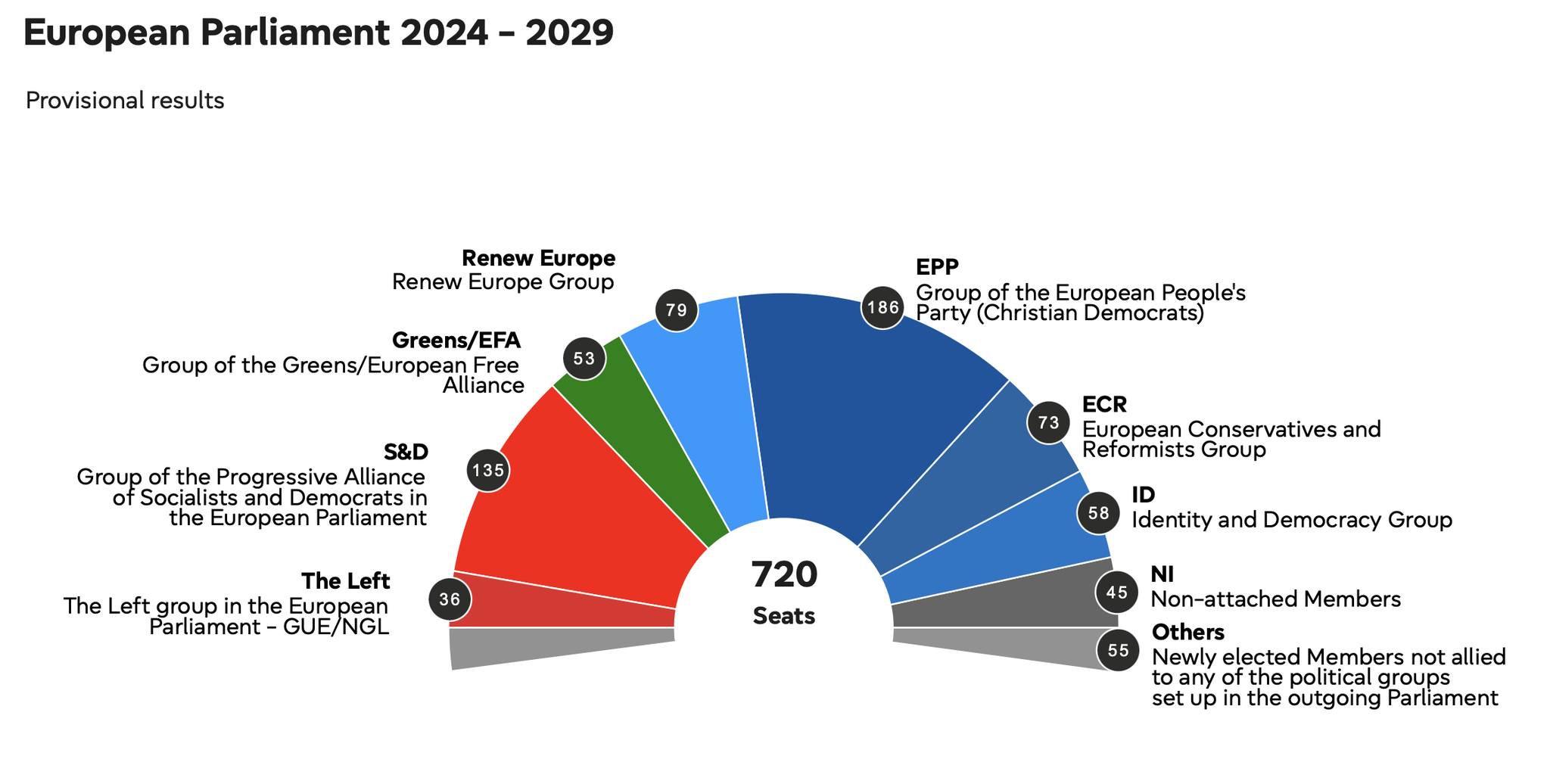The results of the European Parliament elections for 2024-2029 show that far-right parties have some gains, particularly due to the results in France and Germany. However, pro-Ukrainian centrist groups still retain their majority.
European far-right parties, such as Germany's Alternative for Germany (AfD), were found to have ties with Russia and accused of Kremlin influence and Russian propaganda within their ranks.
Nevertheless, the center-right European People's Party (EPP) takes the lead with 186 out of 720 seats, according to the European Parliament. This party largely supports Ukraine in its war against Russia. The centrist coalition, which currently forms the European Commission, is likely to maintain its majority, with Ursula von der Leyen from the EPP expected to be the candidate for the President of the European Commission once again, as stated by Radio Liberty (RL).
Since Russia’s full-scale invasion in 2022, Ursula von der Leyen has been a staunch supporter
of Ukraine, advocating for economic sanctions against Russia and providing financial and humanitarian aid to Ukraine while also encouraging Ukraine's EU membership aspirations.
EPP is followed by its two main partners – the center-left Socialists and Democrats with 135 seats and the centrist Renew Europe party with 79 seats.
According to the European Parliament, the two far-right groups, European Conservatives and Reformists and the smaller Identity and Democracy party, follow with 73 and 58 seats, respectively.
The European Parliament is one of the core decision-making and budget allocation bodies of the European Union. Its responsibilities include matters such as financial aid to Ukraine in its war against Russia and Ukraine’s ascension to the EU.
France
In France, the far-right party National Rally secured first place in the elections, doubling the number of seats compared to President Emmanuel Macron's allies. In response to the preliminary election results, Macron announced the dissolution of the French Parliament on 9 June and called for new elections on 10 June.
Germany
The conservative Christian Democratic Union (CDU) and Christian Social Union of Bavaria (CSU) bloc won the elections in Germany by a large margin, with the far-right Alternative for Germany (AfD) party coming in second place, as expected. Chancellor Olaf Scholz's leading party in the ruling coalition, the Social Democrats, finished third.
In March 2024, German media suspected AfD members of receiving funds from Russia through a pro-Kremlin network, aiming to promote pro-Russian messaging ahead of EU elections.
Both Macron and Scholz have been active in providing military aid to Ukraine since 2022 and recently allowed
Ukraine to strike military targets inside Russia
Austria, Spain, Italy
In Austria, the far-right Freedom Party, known for its criticism of anti-war sanctions against Russia, is leading. In Spain, the right-wing People's Party is slightly ahead of the ruling Socialists.
In Italy, Prime Minister Giorgia Meloni's far-right party, the Brothers of Italy, is leading the European Parliament elections with an expected result of 26-30%.
The Netherlands
However, in the Netherlands, the alliance of Socialists and Greens, led by former European Commission Vice-President Frans Timmermans, is ahead of Geert Wilders' right-wing Party for Freedom, which had convincingly won the parliamentary elections in the fall, according to RL.
Belgium
In Belgium, the right-wing nationalists from the New Flemish Alliance won the elections. Belgian Prime Minister Alexander De Croo announced his resignation following the significant defeat of his party, the Open Flemish Liberals and Democrats, in both the national parliamentary elections and the European Parliament elections.
Approximately 360 million voters from the 27 EU countries were eligible to participate in the 6-9 June voting, which saw higher voter turnout in most countries compared to the 2019 elections.
In the spring of 2024, Russia escalated hybrid attacks on Western allies of Ukraine, including sabotage, cyberattacks, and propaganda ahead of the EU elections. Incidents included Russian agents' increased activities, arrests for espionage in Germany, and cyberattacks in Czechia.
Read more:
Kremlin intensifies sabotage and propaganda in the West ahead of EU elections
Assistant of German far-right AfD top candidate for EU elections arrested in China spy case
The future of the EU is being written in Ukraine, the heart of Europe – Ursula von der Leyen

